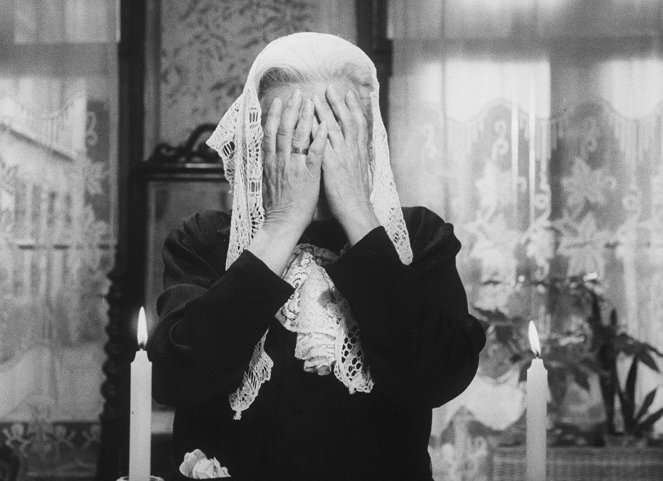Cinematography:
Vladimír NovotnýComposer:
Zdeněk LiškaCast:
Ida Kamińska, Jozef Kroner, František Zvarík, Hana Slivková, Martin Hollý st., Elena Zvaríková-Pappová, Martin Gregor, Adam Matejka, Mikuláš Ladižinský (more)VOD (2)
Plots(1)
An inept Czech peasant is torn between greed and guilt when the Nazi-backed bosses of his town appoint him "Aryan controller" of an old Jewish widow's button shop. Humor and tragedy fuse in this scathing exploration of one cowardly man's complicity in the horrors of a totalitarian regime. (official distributor synopsis)
Reviews (9)
If there is a reason for Kadár and Klos to be burned in hell for their film achievements of the 1950s (and there are a few reasons), then they more than make up for their sins with this film. An excellent chilling drama from the wartime era that shows how dictatorship and dark times can distort human character. By the way, when we compare the acclaimed Hřebejk's film "Divided We Fall" with "The Shop on Main Street", we will understand the difference between a very good film and an outstanding film, and the difference between playing it safe and having filmmaking courage. Overall impression: 100%. One of the best films ever produced by the Czechoslovak film school.
()
A great example that Czech, Czechoslovak and Slovak cinematography definitely have something to say and draw from. A perspective on war through the eyes of ordinary people, a perspective on war through the development of one character, and a development that is brilliantly destructive. What the main pair of actors showcase is as incredible as the masterful experimentation of the directing duo. One of the peaks of Czechoslovak cinematography. Actually, of Czech and Slovak independent cinematography as well.
()
A Czechoslovak cinematic gem that deservedly won the Oscar for Best Foreign Language Film. This superbly constructed story imbued with an atmosphere of fear and emotionally built to the max, is a chillingly accurate portrayal of the time period it is about. The film is adorned with literally fascinating performances by Jozef Kroner and Ida Kamińska. I dare say they both presented themselves here in the best roles of their lives. The last half hour blew my mind. In fact, I can't remember if I've ever had a similarly strong emotional experience with any other film.
()
I've been struggling with accepting The Shop on Main Street for years and it's still like being at sea, once down, once up. The work of the Kadár/Klos duo will always be problematic because their joint ascension in the 1950s is one perversion after another. The Shop on Main Street has a theme comparable to the appeal of Zinnemann's The Search, which is nice, but the tragedy encapsulated in the character of Ida Kaminská is too complicated to be so easily eclipsed by Kroner's traditional citizen in moral distress. Unfortunately, today it is also difficult to understand the dialogues that sovereignly combine Slovak, German, and Yiddish. There could not be a more atypical film for Czechoslovak cinema, and yet it is the one that represented 20 years of State Film in its time and is now honored with the Academy Award as eternal and divine.
()
It's great to work with so many levels and ambivalence of "I'm a good person, after all, I even arise basically against my will, moreover when something comes out of it, but quietly, no one needs to know, especially when I'm calm", and the portrayal of all the characters who walk in front of, in or behind the shop. It's playful in form (hiding from the viewer/camera is exactly what one would expect Herz to have come up with) and it works in multiple ways. It can be unabashedly emotional, everyone acts with gusto, and it's the actions of the characters that are the defining factor, not the declamatory speeches that many other filmmakers would be tempted to make. It is not a probe into the soul of the Slovak nation through addressing the historical skeletons in the closet, but a probe into the soul of an ordinary man under the pressure of the times. Period. That's what makes it timeless. But the whole thing is marred by the ending, where of all the possible outcomes, the one used is by far (but far) the least interesting, and consequently the least compelling. If "it" had at least been done knowingly… Considering the way the central dilemma is handled all along, this is an undignified, cheap "how to get out of it" from Grossman.
()


Ads